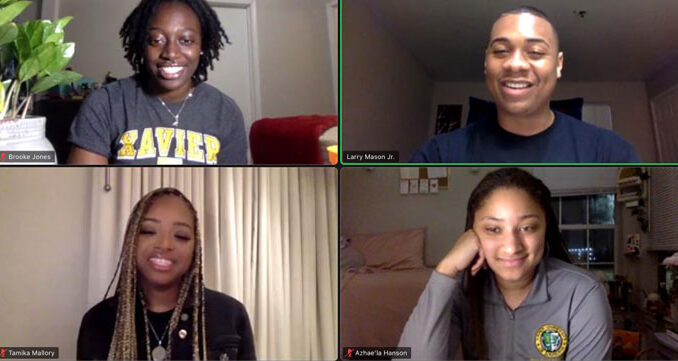
Nia Brown Data News Weekly Contributor
The work of activism is every day, every month, every year and not just during Black History Month alone. Those were the reflections of Bronx native Tamika Mallory, the co-founder of Until Freedom, and one of the co-organizers of the 2017 Women’s March in Washington, D.C. held on the day after the inauguration of President Donald Trump.
“We are not here to just remember but to commit, to commit to what our lifestyles and lives mean, as people who recognize the greatness of Black excellence, Black people, and the Black story, the Black journey,” said Mallory, who spoke to New Orleans student activists as part of a virtual panel discussion jointly sponsored by The Center for Equity, Justice, and the Human Spirit and the Center for Student involvement at Xavier University of Louisiana on Feb. 25.
Mallory, who was criticized for her support of Nation of Islam leader Louis Farrakhan and of activist Assata Shakur shared her experiences in activism alongside student activists Azhae’la Hanson, Brooke Jones, and Larry Mason., Jr.
“We have had one tough year. A year that has challenged us all to really look deep within ourselves, what are we willing to sacrifice, how far are we willing to push the needle, and do we really want justice,” Mallory said. “Do we really want to be free or do we just want to be more comfortable. I think most of us have stood up and said that we really want to see justice and equity happen in this nation,” she said.
Sometimes society forgets that activists are humans too, with emotions, Mallory noted of the public criticism of her advocacy. Activists also need time to gather their emotions that they are feeling from the latest current events, she said. The rest of the world might feel that the activist needs to be the first responder or take the first initial act, which can be impossible sometimes. As important as it is for the average citizen to find their balance in everyday life, it is just as important for activists to also find a balance. They do not always have it together, she said. At times, activists can try to turn their attention away to focus on family and friends or another hobby, but they end up finding themselves back to being an activist, Mallory shared.
“It becomes your lifestyle, it’s not a job, it’s not something you can separate yourself from,” Mallory said.
Social media is now an important tool for advocacy but the panelists shared that it was not enough to simply repost, but to show up in numbers to protest.
“I wish that people online could be more connected to the movement on foot,” said Xavier student activist Azhea’la Hanson.
And while the Black Lives Matter Movement is the current name for Black activism, the panelists noted that the fight for rights and justice will be passed on for generations to come.
“The work is always going to be there. There’s always going to be inequity for us to work on dissolving,” said Xavier student activist Larry Mason Jr. “Advocacy is not just being the voice for voice, it’s being able to say okay I’m going to empower you to use your voice,” Mason Jr. said.
Recommended For You.



Be the first to comment